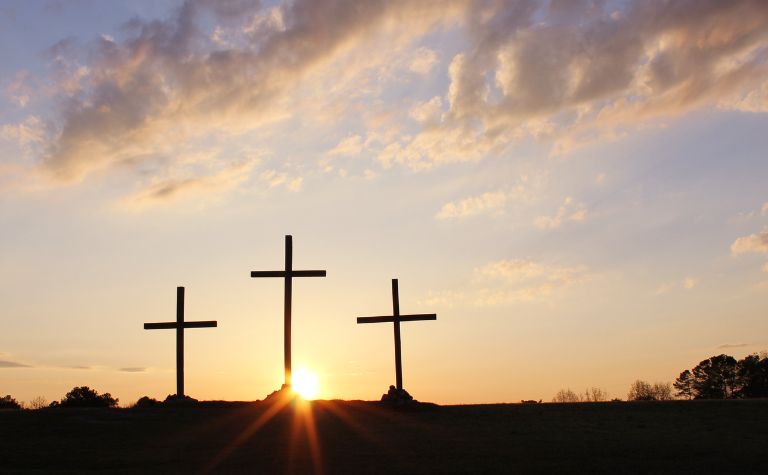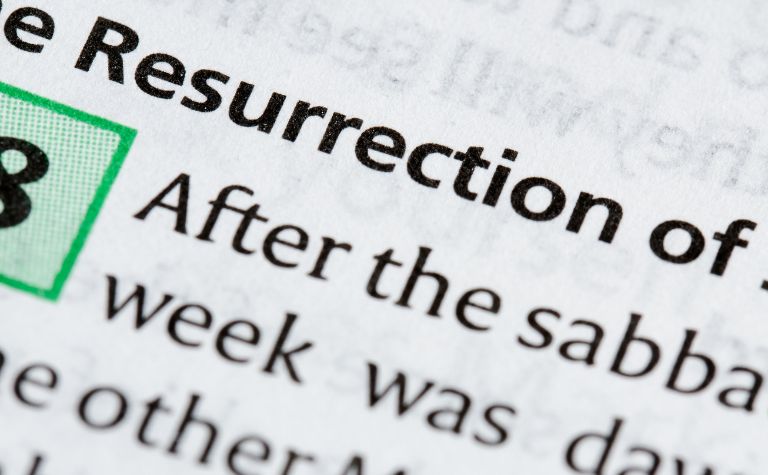Christians love to celebrate the resurrection of Jesus Christ because his victory over sin and death is foundational to their faith (1 Cor. 15:17). Unlike other sacred days on the Christian calendar, which have a fixed date, like Christmas, Easter Sunday in the West occurs on a different date in March or April every year. Many people are curious to know why the date for Easter changes.
The date for Easter changes every year because the early church modeled the time of the annual celebration after Passover. Like other Jewish holy days, Passover is scheduled on a lunar calendar, not a solar one. As a result, Easter is the first Sunday after the paschal full moon after March 21.
How are lunar and solar calendars different? How is the date for Passover determined? What is a “paschal full moon”? How is the Jewish date of 14 Nisan related to Easter Sunday? Who attended the Council of Nicaea where the date was decided? How is Santa Claus connected to the date of Easter? Keep reading to learn the answers to these questions and more.
Also, Easter includes many special events and customs. Some people are curious about what Resurrection Sunday means and how it relates to Easter.

How is the date for Easter decided?
The early church united over their belief that Jesus’ resurrection was the foundation of the Christian faith. Their steadfast belief that Jesus rose from the dead was rooted in the testimony of the Apostles, the four New Testament Gospels, and the teachings of Paul. For example, in 1 Corinthians 15, Paul wrote, “If Christ has not been raised, your faith is futile and you are still in your sins” (1 Cor. 15:17, ESV).
What disagreement arose about Easter? Early Christians disagreed over when churches should hold the annual celebration of Jesus’ resurrection. Like God’s people in the Old Testament had annual holy days commemorating God’s work, the Christian church set aside time to recall Jesus’ resurrection. Because people couldn’t agree on a date, and the dispute concerned an important doctrine, the 4th-century Council of Nicaea (more below) added the debate to its agenda.
How did the date of Passover play into the council’s decision? First, the council decided to use the Jewish date of Passover as a model for when to celebrate Easter, which committed them to a lunar calendar, not a solar one. In the Old Testament, God told the Israelites through Moses, “In the first month, on the fourteenth day of the month at twilight, is the LORD’s Passover” (Lev. 23:5, ESV).
Unlike a solar calendar, such as the Gregorian calendar used in the West today, a lunar one is based on the moon’s phases. As a result, lunar months vary in length, and lunar years are shorter than solar years. One outcome of the lunar calendar is that Jewish holidays have different dates yearly. For example, the dates for Passover in 2023 are April 5-13; in 2024, April 22-30; and in 2025, April 12-20.
How is the date for Passover determined? The first month of the Jewish calendar is Nisan (Exod. 12:1-2), which is in the Spring. Therefore, the annual date that Jewish people celebrate Passover is 14 Nisan (cf. Lev. 23:5). On the Gregorian calendar, it mainly occurs in April (see dates below).
Furthermore, the New Testament Gospels reveal that Jesus was crucified during Passover (e.g., Matt. 26:17-26; John 19:14) as God’s sacrificial lamb (cf. John 1:29).
Also, some Christian traditions have practices and observances during the Easter season that others don’t. Discover what Easter Monday is and its importance for some Christians.

What is the date for Easter? The date of Easter is the first Sunday after the first “paschal full moon” after March 21. March 21 is the fixed date of the Spring Equinox in the northern hemisphere on the Gregorian calendar. What is a paschal full moon?
- “Paschal” comes from the Latin word “Pascha,” meaning “Feast of Passover,” which comes from the Hebrew word for “Passover,” pesah. In the Old Testament, Passover is the first feast of the year and recalls when God passed over the firstborn of Israel and freed his people from Egyptian slavery (Exod. 12:1-32).
- “Full moon” in this sense doesn’t refer to a literal full moon but to 14 Nisan. A full moon often occurs within a few days of the date, but not necessarily on it. Additionally, if the paschal full moon falls on a Sunday, Easter is the following Sunday.
| 14 Nisan | Easter Sunday |
|---|---|
| Wednesday, April 5, 2023 | Sunday, April 9, 2023 |
| Monday, April 22, 2024 | Sunday, March 31, 2024 |
| Saturday, April 12, 2025 | Sunday, April 20, 2025 |
| Wednesday, April 1, 2026 | Sunday, April 5, 2026 |
| Wednesday, April 21, 2027 | Sunday, March 28, 2027 |
| Friday, April 14, 2028 | Sunday, April 16, 2028 |
| March 30, 2029 | Sunday, April 1, 2029 |
| Wednesday, April 17, 2030 | Sunday, April 21, 2030 |
As a result of this calculation, the earliest date for Easter in any year in the West is March 22, and the latest is April 25.
Also, some cultures in the world have special Easter observances. Discover when Greek Easter is and why it’s important to Christians who observe it.

Who decided the date for Easter?
The Western church decided the date for Easter in the fourth century at the Council of Nicaea. This meeting was the first of several important councils that church leaders held to articulate doctrine and settle disputes in the first few centuries of the Christian church. Nicaea was a town in Asia Minor that today is called Iznik, Turkey. Historians estimate that 300 leaders attended the council.
Who attended the Council of Nicaea? Unfortunately, there is no surviving list of people who participated in the council. Yet, there is reliable historical evidence of some individuals who attended. One prominent participant was theologian Athanasius of Alexandria, Egypt (296-373 A.D.). In many ways, Athanasius was the hero of the council as he defended the Bible’s teaching about Jesus against heretics. He was 29 years old at the time.
What has Santa to do with the Easter Bunny? Another notable leader in attendance was the bishop of Myra, Nicholas of Bari (270-343 A.D.), who had a reputation for giving gifts to children. Most people today know the bishop as “Saint Nicholas,” whose identity grew into the legend of Santa Claus. In other words, Saint Nicholas helped decide when Christians would celebrate Jesus’ resurrection.
Is Nicaea known for deciding the date of Easter? No. In fact, many Christians who have some knowledge of Church history don’t realize that the Council of Nicaea is when leaders made the decision. The council’s most urgent theological matter was the false teaching of Arius (250-336 A.D.), who argued that Jesus wasn’t co-equal with the Father and the Holy Spirit.
The Roman Emperor Constantine (272-337 A.D.) called the council to settle this dispute, but other matters, like the date of Easter, were also addressed.
Also, Bible readers know that Judaism and Christianity are historically connected. Discover if Jews celebrate Easter to gain insight into their similarities and differences.
References:
[1] Source
[2] Source
Related Questions
The resurrection of Jesus Christ, along with his crucifixion, is the most important event in Christianity. Without it, the faith that Jesus founded would be groundless. As the Apostle Paul taught,...
The resurrection of Jesus Christ is central to the Christian faith. It's so important that the Apostle Paul said that people should pity Christians if it's not true (1 Cor. 15:19). Yet every year...
